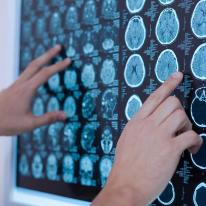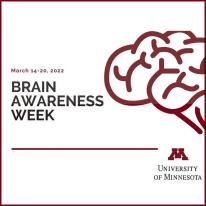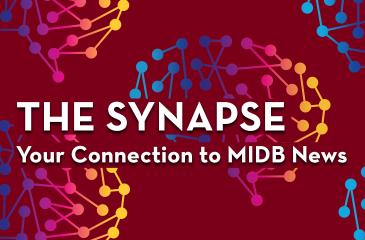The Synapse March 2022
Advancing Research at MIDB

Monica Luciana, PhD, was announced as the MIDB's Chief Scientific Officer on Feb. 28, 2022. Dr. Luciana, a Distinguished McKnight University Professor in the Department of Psychology, College of Liberal Arts, will be responsible for coordinating a host of research-related activities for the MIDB, including developing a strategic research plan for the institute and promoting opportunities for research collaborations. Please see the below letter from Dr. Luciana about her new role at the MIDB.
I am thrilled to serve as MIDB’s new chief scientific officer and to work with all of you to identify and foster integrative activities across our research, clinical and community efforts. I am especially excited to help bring together people who haven't formally collaborated with one another and encourage interdisciplinary research that is development in nature.
Since starting in this role, I have been getting to know the various researchers associated with MIDB, as well as working to establish a formal mechanism to connect with other researchers across the U doing work that fits MIDB’s mission. By identifying those people and understanding their research, we at MIDB can better understand where we have areas of strength across the U and identify potential areas of future growth.
What I love about the work happening at MIDB is the support of all phases of development, and thinking of development in terms of its continuity of one state to the next for children as they navigate various transitions. I personally love being able to try to understand that process mechanistically and longitudinally and apply it to clinical problems. I am proud to be a part of MIDB and its unique environment that allows that broad perspective to be taken and to be understood.
I strongly believe our patients and families benefit from engaging in evidence-based treatments. One of the really exciting things about MIDB’s research operations is that we span the full range from preclinical work to understanding basic mechanisms of emotion, cognition and development, and how those mechanisms deviate when children experience different kinds of difficulties or disorders. From that perspective, we can better understand where our interventions are likely to be useful, what the optimal interventions might be, and when is the best time to apply them.
We are currently exploring ways for all of us to get to know one another better, and develop and share opportunities and ways in which MIDB can help support your work. We will share more details with you as they develop over the next few weeks.
Thank you,
Monica Luciana, PhD
MIDB Chief Scientific Officer

Brain Studies Show Thousands of Participants Are Needed for Accurate Results
New research published March 16, 2022 in Nature from the U of M and Washington University School of Medicine in St. Louis is highlighting a path forward for brain imaging use in diagnostics, prognostics, and treatment response in psychiatric, psychological, and neurological conditions. The research shows that most published brain-wide association studies are performed with too few participants to yield reliable findings. “For decades we’ve been highlighting the potential for MRI to assist in the clinical care — including the diagnosis, risk, response to treatment, etc. — for mental health disorders and neurologic conditions. However, the full potential has not been realized,” said Damien Fair, PA-C, PhD, senior author and Redleaf Endowed Director for MIDB. “We now know our missteps and are redefining the required parameters, the so-called ‘special sauce,’ to move forward effectively.” Read more about this study.

Driven to be a Purposeful Scientist
Meet Sanju Koirala, a first-year graduate student in the Developmental Science program at the Institute of Child Development and a member of both the DCAN Lab and the Elison Lab. A self-described first-generation, international, woman of color in science, she is passionate about making science more equitable and accessible to students from underrepresented backgrounds globally. “I had never met a scientist or stepped in a research lab before coming to the U.S., and I feel extremely fortunate to have found the right mentors and opportunities at the right time throughout my career,” said Koirala. “However, if we really want to do science that includes and benefits all, we cannot rely on fortune to bring one brown girl at the table. So, I want to work towards actively adding more chairs and making sure that all chairs are equally sturdy.” Read more about Sanju.

At the Forefront of Advancing Care of People and Families Touched by Rare Disease
Julie Eisengart, PhD, LP, is an associate professor in the Department of Pediatrics and the director of the Neurodevelopmental Program in Rare Diseases (NPRD). Since its inception in 2020, the NPRD has brought together diverse specialists who have been working in rare disease to deepen the understanding of the functional, quality of life, and mental health impacts of rare diseases. Much of this work is building on the legacy of the U’s pediatric neuropsychology program, one of the first in the U.S. The NPRD partners with other entities across the U of M, and was recently moved to the MIDB. “We’re really excited about MIDB and the opportunities for research, collaboration and serving our community,” said Eisengart. Learn more about NPRD’s work.

Study Shows Children of Depressed Mothers Have a Slower IQ Growth Compared to Children of Healthy Mothers
Published in the Feb. 16, 2022 issue of Journal of Affective Disorders Reports, a new study from University of Minnesota researchers and colleagues shows that children of depressed mothers had less of an increase in intelligence trajectories compared to children of healthy mothers. “Our study’s findings replicate previous research that suggests that children born to and raised by mothers with a mood disorder may not be reaching their potential in the intellectual domain,” said Bonnie Klimes-Dougan, PhD, an associate professor of psychology and co-leader of the RAD (Research in Adolescent Depression) Lab. “However, impaired performance on IQ tests may not be uniform and may instead vary based on the child’s age, sex, and the type of parental mood disorder present. For instance, our findings indicate that risk accumulates across development for children of mothers with major depressive disorders. High IQ also appears to be a protective factor for early onset mood disorders, at least in males.” Read more about this study.

Brain Awareness Week
Brain Awareness week is a global campaign to foster public enthusiasm and support for brain science. U of M neuroscientist Manny Esguerra presented on the human brain, what it does, and how it can trick you. Watch the presentation and past Brain Awareness Week presentations.

Bettering Lives and Communities
As MIDB opened its doors to patients and families, the clinic received a generous gift from The WEM Foundation to support our mission to provide comprehensive and specialty care for children with neurobehavioral conditions. As a committed partner in advancing early childhood development, the foundation's support provides critical funding to integrate clinical care with research to improve the way we serve and treat children and families in our community. The WEM Foundation's philanthropic impact spans arts and cultural programs, education, health care and human services.

Autism, Age, and Race
Newly published research by authors from the U of M found racial disparities in identifying autism in young children, and overall prevalence rates point to broad implications for all children with autism as they grow into adulthood. “Our study found that Black, Asian, and Hispanic children were more likely than white children to have been identified with autism only in a school setting, which suggests they may have less access to specialized autism evaluations in clinic settings,” said Amy Esler, PhD, LP, associate professor of pediatrics and one of the study's authors. “Children who only accessed school evaluations were identified with autism more than a year later than those who had access to a clinic evaluation. The study demonstrates the critical importance of early, accurate identification, and how racial and other disparities continue to affect how and when children are identified as needing services.” Read more about the study.



